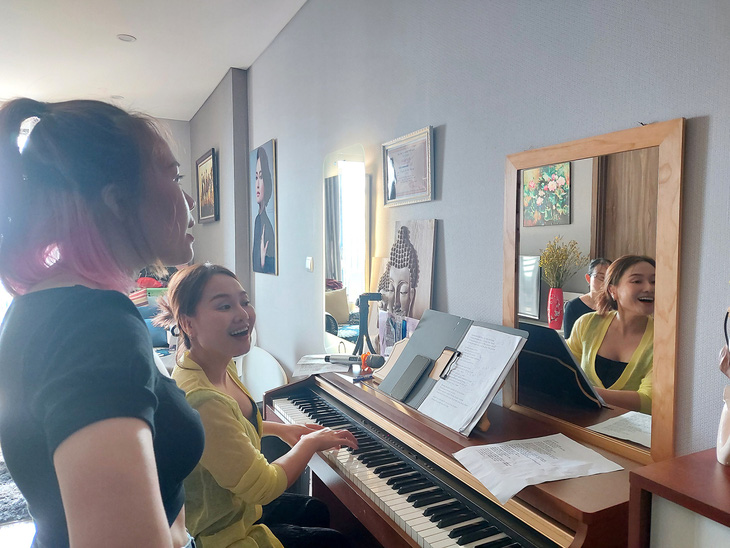Vietnamese people are taking up singing classes to perform better at karaoke bars. The trainees primarily aim for proper covers of their favorite songs in tune, pitch and timing, not to make a professional career.
According to Hoang Anh, a resident of Tan Binh District, Ho Chi Minh City, her husband has been doing his karaoke vocal training behind closed doors every evening.
The song he has been practicing so diligently is the recent Vietnamese hit Dau Ai Chung Tinh Duoc Mai (Love Doesn’t Last Forever).
Free or paid -- the daily vocal training
“He used to sing along with his karaoke stereo, but now there are vocal lessons on YouTube with proper instructions," Anh explained.
"He finds these a good way to practice.
“I was wondering if his company was hosting a karaoke singing contest, but it turned out he simply hoped to sing with the right tune and correct timing in karaoke bars.”
YouTube-based vocal training lessons by well-known songwriters have been attracting more viewers.
Pham Thanh Luan and Pham Huong, both popular songwriters in Vietnam, have produced such clips that have garnered over a million views.
YouTube users leave comments on the clips asking for more instructions of their favorite songs.
Besides the free YouTube tutorials, premium vocal training courses with professionals are also a popular choice for those working on better karaoke covers of their loved songs.
Taking singing professionally is not in their future plan.
Thu Phuong – runner-up in the Vietnam’s Sao Mai pop song contest in 2007 – welcomed two trainees at her apartment on Ba Thang Hai Street in District 10, Ho Chi Minh City one afternoon in February.
“Remember to breathe in and hold for a while. Don’t let your air out so quickly, and remember that emotions make a performance better,” said the trainer.
The two learners were highly focused.
Following the first session, My Hanh, a 40-year-old resident in Go Vap District, said that she was preparing for future singing sprees.
“When I’m in my 50s and 60s, I will still be able to join some kind of music club, and now I will be singing properly when my family are out at a karaoke bar," Hanh said.
Meanwhile, Tram, a 29-year-old resident in District 2, Ho Chi Minh City, acknowledges her passion for singing and her lack of expressiveness in the act.
“If my voice can be enhanced, I may apply for a singing contest, but for now I just need to sing nicely in tune,” she said.
According to Phuong – the vocal trainer – a lot of people hope to keep a few songs up their sleeves and perform them at friendly gatherings.
When something is worth doing, it’s worth doing well
'Singing nicely is not as important as singing daily' is a popular Vietnamese contemporary idiom that is used to encourage a shy member in a karaoke bar or as an excuse for those who love to drink and sing at wedding receptions.
However, a greater emphasis has been placed on the quality of the vocal tone. A search engine prompt for karaoke lessons can produce as many as 10 million results.
This implies that the needs for vocal training are on the rise, driving music schools to open karaoke training classes.
Thang – director of a performance arts center providing courses in acting, hosting events, and singing based in District 5, Ho Chi Minh City – said that his school caters to both professional and amateur singers, especially office workers keen on karaoke bar covers.
Most of their students are elderly people with a passion for singing.
Surprisingly, music schools for young learners training in instruments have also made vocal courses available to both groups and private learners.
According to Khanh, currently in charge of a music center in Tan Binh District, learning to sing in a soundproof environment helps to eliminate reservation, boost performance, and diminish stage fright.
On her part, Thu Phuong has only dabbled her feet in semi-professional vocal training for a few months, despite her nine years of experience providing professional lessons.
“I once had this conversation with a learner who claimed that their voice was weak and they wanted to improve that,” said Phuong.
“Having them tested, I found that they were lacking in both tonal quality and timing, but they were passionate.
“I begin to wonder why I should not give them instructions now that they are so eager to sing for their family and friends, although they have no long-term goal of becoming a quality singer.”
She had only one learner at first, but through word of mouth more people signed up for her class.
There are also coursebooks to be used in these training programs.
“Teaching vocal training lessons is a skill. It will be easy for those with a born knack for music, but for those without, the first thing to do is to be patient and meticulous in your instructions,” said Phuong.
“We have to help them understand music in a simplistic way.
"If they understand the mechanism of singing and make progress on a daily basis, that is the success of trainers.”
Like us on Facebook or follow us on Twitter to get the latest news about Vietnam!


















































